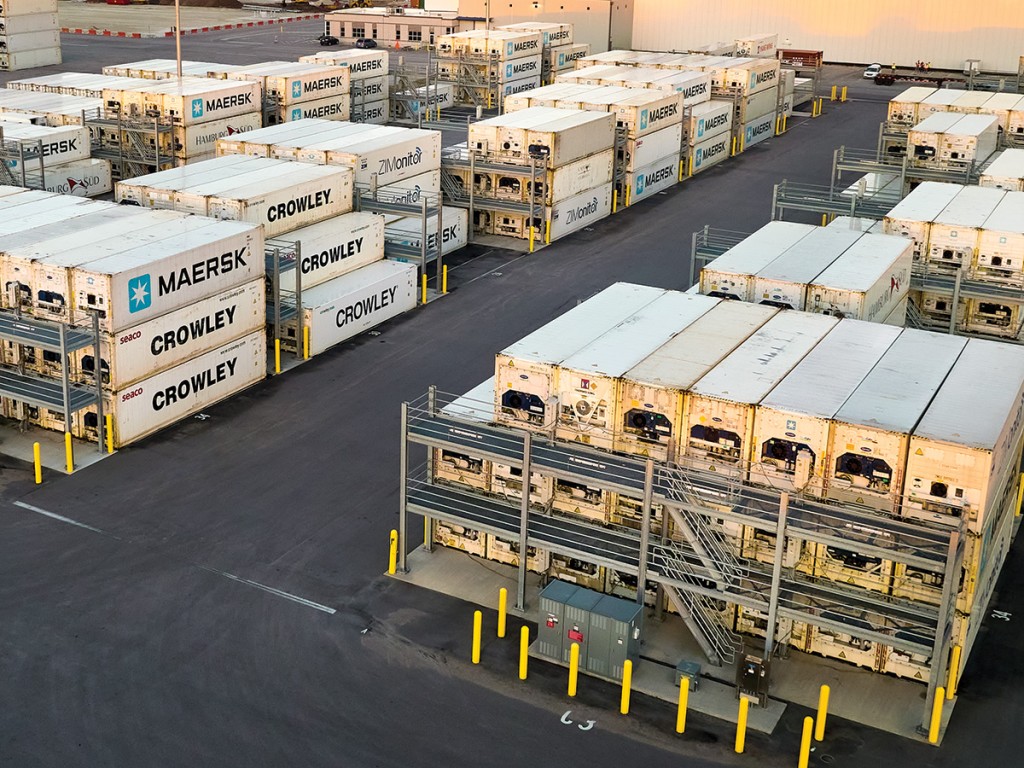Despite accelerated activity by major TCL players, new capacity will likely “fall well short of market demand.”
Although many of the supply-chain and other economic consequences of the COVID-19 pandemic have begun to dissipate, there is still at least one phenomenon that is still with us—more Americans are still consuming more food at home. Not only that, but according to a report published by the American Frozen Food Institute, 29% of U.S. households expanded their freezer capacity during the pandemic. Retail frozen food sales in the United States increased by 37% between 2018 and 2022, according to the same report, and continue to outpace the pre-pandemic year of 2019 in 2023.

“For manufacturers, this could shift the just-in-time mindset to a safety stock approach,” said the RSL report, “causing additional demand for inventories.” But, at the same time, “cold storage warehousing capacity remains tight nationally,” and is getting tighter, thanks to “inventory levels rising and turns decreasing” and “many manufacturers increasing production output.”
In the northeast U.S., the most densely populated region in the country, “there is tremendous demand,” said Neil Johnson, CEO of Provender Partners, a cold-chain investor, and operator, but “there is virtually no available freezer space.”
Judging from the activity in the marketplace, major temperature-controlled logistics (TCL) players, such as RLS, Provender, and Lineage Logistics, are attempting to make up for the shortfall by adding millions of square feet of frozen and other temperature-controlled storage space to their portfolios. But whether they will succeed in expanding rapidly enough to satisfy demand is another matter.
Last October, the Glassboro, N.J.-based RLS Logistics opened a cold storage warehouse in Sturbridge, Massachusetts, an 83,000 square-foot, 18,000-pallet facility for frozen and refrigerated foods. The facility will service the state from Springfield to Boston and will provide “public cold storage warehouse capacity relief,” according to Bryan Hedge, president of RLS Complete, an RLS joint venture. The facility’s mobile racking system allows the warehouse to hold 40% to 45% more pallet positions than standard facilities.
RLS is also expanding its Newfield-N.J. cold-storage warehouse location, a project expected to be complete by the end of this year. “We have always been tight on capacity,” says John Gaudet, the company’s vice president of business development. “This expansion allows us to increase inventory storage and our capabilities in e-commerce fulfillment and LTL cross docking” in the Philadelphia area.
Online growth has been noticeable in the perishables market generally and for frozen foods in particular, according to the AFFL report. “Consumers do not shy away from buying frozen foods online,” the report said. “The share of dollars coming from online outlets has grown from 0.9% in 2019 to 2.9% in 2022.”
Lineage Logistics, the largest temperature-controlled industrial real-estate investment trust, last year expanded its Direct-to-Consumer (D2C) fulfillment solution, which includes the acquisition of Perishable Shipping Solutions, a temperature-controlled pick-and-pack order fulfillment service. That acquisition followed the company’s 2021 acquisition of Crystal Creek Logistics, a provider of last mile drop-ship order fulfillment for temperature-controlled goods. Lineage’s D2C Fulfillment solution executes over 2.5 million shipments annually.
Lineage has been on an acquisitions tear since 2021, when it acquired Sun Valley Cold Storage of Swedesboro, N.J., and Kloosterboer, a Rotterdam-based company that operates fresh facilities there and in New York. Lineage is expanding the Sun Valley facility with an additional 5,000 pallets coming online this year. Lineage also recently opened a new refrigerated storage facility at the Port of Savannah. In August 2021, Lineage acquired Hanson Logistics’ cold-storage distribution network, which includes over 46 million cubic feet of temperature-controlled warehouse space in Michigan and Indiana.
Lineage has been expanding in Canada as well, with the acquisition a year ago of VersaCold Logistics Services, one of Canada’s leading cold-chain solution providers. Headquartered in Vaughan, Ontario, VersaCold runs 24 temperature-controlled facilities comprising 114 million cubic feet across nine provinces, including properties in Toronto, Calgary, Vancouver, Edmonton, and Montreal.
Provender Partners acquired a one-million-square-foot cold storage portfolio of properties over the last three years with assets in Oakland, Las Vegas, Berkeley and Bolingbrook, Illinois, and Birmingham, Alabama. “We increased the portfolio’s occupancy rate to 100% by leasing the assets to high-quality companies,” said Johnson. Tenants include local and regional wholesale food logistics companies, food service providers, and frozen food packagers.
In August 2022, Provender acquired a 217,540-square-foot temperature-controlled food production and distribution facility, with around 140,000 square feet devoted to freezer and cooler space, in Vineland, NJ, from Safeway Fresh Foods, leasing it back to the agriculture and food manufacturing company. Safeway’s fresh food division Sunnyside Farms provides fresh and prepared foods to retailers in Mid-Atlantic states.
The facility, said John Long, Jr., Provender’s COO, “is well positioned to provide same or next day delivery for retailers serving a population of 57 million within a 250 mile radius.”
Earlier in 2022, Provender acquired two Class A cold storage warehouses totaling 316,000 square feet in Londonderry, New Hampshire. The acquisition represented “a prime opportunity,” said Long, “to tap into the food supply chain that serves 87 million people from Washington, D.C., to Montreal and Boston to Pittsburgh, all located within a single day’s truck drive.”
The Orange County, Calif.-based company acquired two million square feet of food-related industrial buildings in 2021, including a 255,000-square-foot building in Delanco, N.J., which serves as the refrigerated and frozen food distribution facility for national e-commerce food company Misfits Market.
For all of these developments, the RLS report was skeptical over whether TCL providers will be able to satisfy growing demand. “As long as inflation remains high, we anticipate elevated inventories,” its report read. “The demand for cold storage continues to increase and is expected to continue for years, but new capacity is anticipated to fall well short of the market demand.”




